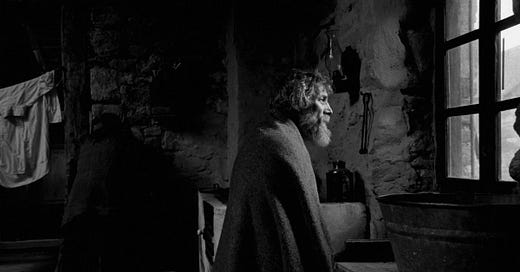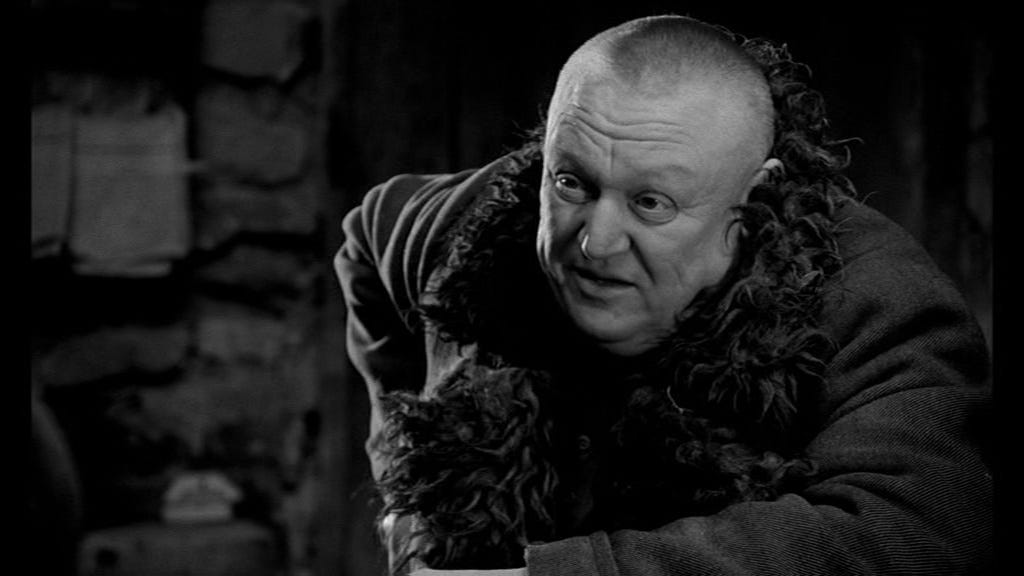Director Béla Tarr’s 2011 and his last film, The Turin Horse, was the film that I watched at an interesting point in my life. I say interesting for I had myself introduced to the work of Andrei Tarkovsky at the time. As I was also reading the Tarkovsky book Scultping in Time, my entire cinematic approach was in the process of changing. I was becoming more critical of films rather than letting filmmakers fool me.
The Turin Horse, sadly, was Tarr’s last film because Tarr decided to retire. However, all the films that he has made are good enough to still watch because they are not easy to watch. They are not easy, not because they are not good, but because they are some of the greatest works of cinema. The greatest works of cinema take time to make and also take time to be fully comprehended.
Cinema shouldn’t be easy, in my opinion. In other words, just for entertainment, but to challenge you and even change you. I also believe more in cinema when it is less regarding happy endings.
The American film industry indicates that cinema is mostly about happiness; however, we do still manage to get some great films that discuss with us the realistic world and its challenges.
Tarkovsky’s approach, without a doubt, differs from Tarr’s views. There’s a reason why Tarr once said that “Tarkovsky is more innocent than me. In his films, rain purifies people. In mine, it just makes mud.”
I can go on and on, but I’ll leave that for some other time. I’m sharing an interesting piece of information regarding The Turin Horse, in which a character discusses the end of all things. It’s quite interesting to dive into the concept of such an idea in order to grasp not only the cinematic approach of Tarr but his worldview, because, as we know, great artists are at war with this idea that we should be aware of our deeds as beings.
As we witness the beauty of Tarr’s film, shot entirely in black and white with some of the greatest long shots, we’re introduced for the first time to the character of Bernhard visiting Ohlsdorfer and his daughter:
Bernhard: “I’ve run out of palinka. Would you give me a bottle?”
Ohlsdorfer: “Give him some… Why didn’t you go into town?"
Bernhard: "The wind’s blown it away."
Ohlsdorfer: "How come?"
Bernhard: "It’s gone to ruin."
Ohlsdorfer: "Why would it go to ruin?"
Bernhard: "Because everything’s in ruins, everything’s been degraded, but I could say that they’ve ruined and degraded everything. Because this is not some kind of cataclysm coming about with so-called innocent human aid. On the contrary, it’s about man’s own judgement over his own self, which of course God has a hand in, or dare I say: takes part in. And whatever he takes part in is the most ghastly creation that you can imagine. Because, you see, the world has been debased. So it doesn’t matter what I say because everything has been debased that they’ve acquired and since they’ve acquired everything in a sneaky, underhand fight, they’ve debased everything. Because whatever they touch—and they touch everything – th’ve debased. This is the way it was until the final victory. Until the triumphant end. Acquire debase, debase, acquire. Or I can put it differently if you like: to touch, debase, and thereby acquire, or to touch, acquire, and thereby debase. It’s been going on like this for centuries. On, on, and on. This and only this, sometimes on the sly, sometimes rudely, sometimes gently, sometimes brutally but it has been going on and on. Yet only in one way, like a rat attacks from ambush. Because for this perfect victory, it was also essential that the other side… That is, everything that’s excellent, great in some way and noble should not engage in any kind of fight. There shouldn’t be any kind of struggle, just the sudden disappearance of one side, meaning the disappearance of the excellent, the great and the noble. So that by now these winning winners who attack from ambush rule the earth, and there isn’t a single tiny nook where one can hide something from them. Because everything they can lay their hands on is theirs. Even things we think they can’t reach but they do reach are also theirs, because the sky is already theirs and all our dreams. Theirs is the moment, nature, and infinite silence. Even immortality is theirs, you understand? Everything, everything is lost forever! And those many noble greats and excellents just stood there, if I can put it that way. They stopped at this point and had to understand and accept that there is neither god nor gods. And the excellent, the great, and the noble had to understand and accept this night from the beginning. But of course they were quite incapable of understanding it. They believed it and accepted it but they didn’t understand it. They just stood there, bewildered but not resigned, until something—that spark from the brain—finally enlightened them. And all at once they realized that there is neither god nor gods. All at once they saw that there is neither good nor bad. Then they saw and understood that if this was so, then they themselves do not exist either! You see, I reckon this may have been the moment when we can say that were extinguished, they burnt out. Extinguished and burnt out like the fire left to smolder in the meadow. One was the constant loser, and one was the constant winner. Defeat victory, defeat victory, and one day here in the neighborhood I had to realize, and I did realize, that I was mistaken. I was truly mistaken when I thought that there has never been and could never be any kind of change here on earth. Because believe me, I know now that this change has indeed taken place."
I’m off to write my screenplay now.





